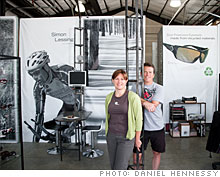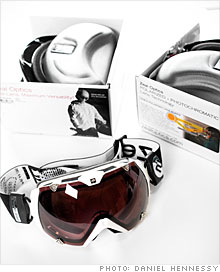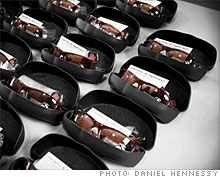Zeal Optics' vision quest
A high-performance eyewear maker gears up for growth.
 |
| Wink and Michael Jackson, founders of Zeal Optics |
 |
| High performance: The Zeal Detonator |
 |
| Ready to wear Zeal glasses |
BOULDER (Fortune Small Business) -- Another bright day breaks in Boulder. On most mornings Michael Jackson and his wife, Wink, would hop on their bicycles and ride the 15 miles to the office, but today they drive. The tanned and toned couple want to be fresh for their Makeover. Before they leave home, each grabs a pair of oversize sunglasses.
Both former professional mountain bikers and triathletes, the Jacksons run Zeal Optics, a company that makes fashionable, high-performance sunglasses and ski goggles, sold on its Web site and through retailers nationwide.
"Eyewear is a critical piece of athletic equipment," Wink, 46, explains. "My sunglasses were always fogging up or falling off."
The pair met in Japan in 1990, where both had moved to teach English before turning pro on the mountain bike racing circuit. After five years Wink quit racing to launch a professional mountain biking team. At about the same time, bike manufacturer Cannondale hired Michael to develop its sales and production division in Japan. In 1995 the two moved to Moab, Utah, where they started Zeal. Wink, who serves as president, oversees sales and marketing, while CEO Michael handles sourcing and production.
In 2008 Zeal's sales hit $2.3 million, a solid achievement in a highly competitive industry. But the Jacksons want more. They're gunning for $25 million in annual revenues within the next 10 years. Relocating to Boulder from Moab in May 2008 was part of that plan. Since the move, Zeal has been able to draw from a deeper talent pool, hiring nine employees to run its sales office and warehouse. The couple have also networked with other fitness and sports companies, as well as with professional athletes who can serve as Zeal spokespeople.
Michael, 47, lists the company's challenges. First, expand its distribution among sports retailers and optical stores. Second, improve marketing, particularly in new media. And, third, raise growth capital.
Recently three Fortune Small Business experts sat down with the Jacksons under a tent on the company's loading dock, a setting that offers spectacular mountain views and overlooks the heavily traveled Goose Creek bike path. Everyone dons Zeal sunglasses before getting to work.
"You have tremendous opportunities -- there are 2,500 retail doors to open out there," says Scott Jaeger, 37, a senior analyst at Leisure Trends Group, a Boulder-based firm that tracks sales at outdoor retailers. "The top three brands -- Oakley, Costa del Mar and Smith -- own 70% of the market. But you have superior technology at a lower price." (Wink says Zeal is the only company that makes polarized photochromatic ski-goggle lenses, which reduce glare and darken when exposed to sunlight.)
Zeal's independent sales reps also handle other outdoor-gear accounts. Jaeger stresses that the company must stay in constant contact with these reps to ensure that they are giving Zeal the attention it requires. He turns to the numbers, seeking ammo the reps can use on sales calls.
"You had about 86% sales growth in goggles for 2007, when the category overall was down 14%. That's your biggest bullet," he says. "Retailers are investors; they want products that sell."
Wink points out that Zeal currently has the top-selling ski goggles at outdoor-gear retailer REI. Jaeger perks up. "Fight with your strengths," he says. "The ski-goggle product targets a narrower segment, a good place to focus your limited resources."
Jaeger is happy to hear that Zeal gives a pair of sunglasses to each retail employee who sells a certain number of them. "When I was a floor rat for Eastern Mountain Sports, I sold the products I owned and loved," he recalls.
But Jaeger suggests that the Jacksons go a step further by using Zeal's Twitter and Facebook accounts to build a community of salespeople at REI and other retailers. For example, they could respond to Twitter posts that mention Zeal, or create an area on the company's Facebook page where sales reps can offer feedback.
Zeal has a full-time Webmaster on its staff. Its Web site, although sophisticated, has some weak spots, says Laura Kornish, 40, an associate marketing professor at the Leeds School of Business in Boulder. Kornish isn't pleased that the section featuring the women's line looks completely different from the rest of the Zeal site. And it's not clear from the site that Zeal sells products online.
Michael tells Kornish that Zeal has been experimenting with pay-per-click marketing, using Google (GOOG, Fortune 500) AdWords to buy search terms such as "polarized goggles" and "polarized sunglasses."
Kornish immediately spots a problem. "Those words aren't incorporated into your page text, which is what search engines look for," she explains.
Kornish advises Michael to use Analytics, Google's free Web-traffic-analysis tool, to better understand how customers find and use the site. She also suggests purchasing "long tail" search terms, which are longer and more specific than the average search term. For example, instead of paying a fortune (about $2.75 as of June 2009) and competing with hundreds of other retailers for "sunglasses," Zeal could pay about 25 cents to obtain the less sought-after "polarized triathlon sunglasses." Fewer searchers will use the more specific term, but they will more likely become buyers. Best of all, because AdWords works on a pay-per-click basis, you pay only when users click on your ad.
Kornish is glad that Zeal has been marketing through Facebook and Twitter, but she encourages Michael and Wink to explore more opportunities on both sites.
"Get in there and experiment," she says. "Nobody has these things figured out yet, but it's fun." However, she warns against oversharing: "Find natural occasions where you or a customer might discuss your product in online forums. Don't force it."
This reminds Wink of the time she traded sunglasses with another cyclist on a four-hour ride from Boulder to the mountaintop town of Ward, Colo. The other cyclist loved Wink's Zeals, but the borrowed sunglasses Wink wore nearly ruined her ride. Kornish says that would have been an entertaining story to tell on Facebook, Twitter or the company Website.
She also advises the Jacksons to develop relationships with bloggers. Asking bloggers and other sites to link to Zeal will boost its search engine ranking. And it's equally important to bond with customers. "Encourage them to chime in," she urges. "Studies show that 83% of consumers trust online user reviews over expert reviews."
Next up is Dave Maney, 46, co-founder of Headwaters MB, a Denver investment bank that finances small to mid-size companies. The couple have been looking forward to hearing Maney's advice, but the banker's news isn't good.
"All investing -- private equity, venture capital, banks -- is disrupted," he tells them. "It's like a hard freeze. It softens from the top, and smaller companies are at the bottom." Maney sighs before adding, "It's going to be a long winter."
Now is probably not a good time for Michael and Wink to enter the capital markets. Instead they should lay the groundwork that will make Zeal more attractive to investors when the thaw finally begins.
"Put your house in order," Maney advises. "Tighten your operational and accounting nuts and bolts. Are your financials sound? Does your office make the best impression?"
In the current economy small companies can take risks without incurring harsh judgment from future investors. "Investors won't ask what you were thinking," explains Maney. "You can shut part of the business down, form partnerships, merge, whatever." Ordinarily an investor would comb through a five-year period for oddities, he says, but today aberrations can be excused by the recession.
In addition, Maney asks the Jacksons to create a solid board of advisers. "Each member should be able to connect you to clients, retailers, product designers or capital." Wink glances at Michael and mentions some promising names -- businesspeople they've met since moving to Boulder.
And Zeal needs to use its limited resources more efficiently. "Aim to be the giant killer, not the giant," Maney says.
He advises the couple to focus their product line on goggles and women's glasses, a more manageable sector of the bloated sunglass market. But neither Wink nor Michael seems eager to specialize. "Sunglasses take more work than goggles," says Wink. Sunglass retailers order year-round, she explains, requiring Zeal to guess at demand and to stock inventory that might not sell. In contrast, ski industry buyers order goggles in advance from January through April, allowing Zeal to compress its annual sales cycle into a few months. Wink also acknowledges that sunglasses have lower profit margins.
"We've talked about cutting the sunglasses," she says. "But we develop our consumer base with year-round business."
As the marathon meeting winds down, the Jacksons seem tired but happy. "We're so close to the business that we sometimes overlook the obvious," Wink says. Michael agrees, adding, "As a small business, we can make the changes immediately."
Just weeks after the meeting, the Jacksons were already tweaking. Michael redesigned the Website's home page to feature critical elements of the Zeal story and included links customers can click on for information on topics such as "Lens Innovation" and "Women's Specific." He also optimized the site for search engines by including more search terms in the text. Meanwhile, Wink sparked encouraging customer response by using Twitter to announce special deals.
Although the couple considered paring their product line, they ultimately decided to keep both men's and women's sunglasses. "The sports industry hasn't embraced the women's sunglass category," Wink says. "So we may start talking about how our sunglasses fit smaller faces. Nobody else is doing that."
FSB will keep up with the Jacksons and let you know if they reach their goals.
Correction: Analyst Scott Jaeger said that there are 2,500, not 250,000, retailers across the country that could sell Zeal Optics eyewear. This article's text has been updated to reflect the change; Fortune Small Business regrets the error. ![]()
-
The Cheesecake Factory created smaller portions to survive the downturn. Play
-
A breeder of award-winning marijuana seeds is following the money and heading to the U.S. More
-
Most small businesses die within five years, but Amish businesses have a survival rate north of 90%. More
-
The 10 most popular franchise brands over the past decade -- and their failure rates. More
-
These firms are the last left in America making iconic products now in their twilight. More









